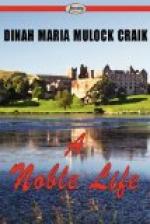The day after Lord Cairnforth’s coming of age Mr. Menteith formally resigned his trust. He had managed the property so successfully during the long minority that even he himself was surprised at the amount of money, both capital and income, which the earl was now master of, without restriction or reservation, and free from the control of any human being.
“Yes, my lord,” said he, when the young man seemed subdued and almost overcome by the extent of his own wealth, “it is really all your own. You may make ducks and drakes of it, as the saying goes, as soon as ever you please. You are accountable for it to no one—except One,” added the good, honest, religious man, now growing an old man, and a little gentler, grave, as well as a little more demonstrative than he had been twenty years before.
“Except One. I know that; I hope I shall never forget it,” replied the Earl of Cairnforth.
And then they proceeded to wind up their business affairs.
“How strange it is,” observed the earl, when they had nearly concluded, “how very strange that I should be here in the world, an isolated human being, with not a single blood relation, not a soul who has any real claim upon me!”
“Certainly not—no claim whatsoever; and yet you are not quite without blood relations.”
Lord Cairnforth looked surprised. “I always understood that I had no near kindred.”
’Of near kindred you have none. But there are certain far-away cousins, of whom, for many reasons, I never told you, and begged Mr. Cardross not to tell you either.”
“I think I ought to have been told.”
Mr. Menteith explained his strong reasons for silence, such as the late lord’s unpleasant experience—and his own—of the Bruce family, and the necessity he saw for keeping his ward quite out of their association and their influence till his character was matured, and he was of age to judge for himself, and act for himself, concerning them. All the more, because remote as their kinship was, and difficult to be proved, still, if proved, they would be undoubtedly his next heirs.
“My next heirs,” repeated the earl—“of course. I must have an heir. I wonder I never thought of that. If I died, there must be somebody to succeed me in the title and estates.”
“Not in the title,” said Mr. Menteith, hesitating, for he saw it was opening a subject most difficult and painful, yet which must be opened sometime or other, and the old was too hones to shrink from so doing, if necessary.
“Why not the title?”
“It is entailed, and can be inherited in the direct male line only.”
“That is, it descends from father to son?”
“Exactly so.”
“I see,” said the young man, after a long pause.
“Then I am the last Earl of Cairnforth.”
There was no answer. Mr. Menteith could not for his life have given one; besides, none seemed required. The earl said it as if merely stating a fact beyond which there is no appeal, and neither expecting nor desiring any refutation or contradiction.




